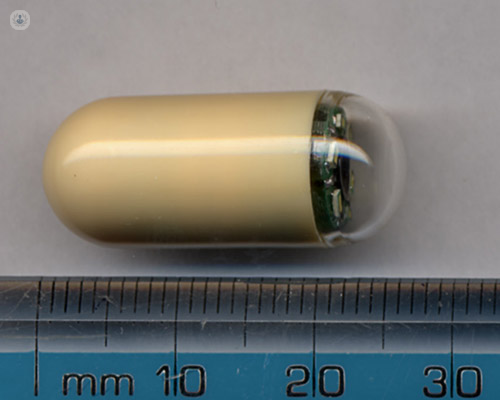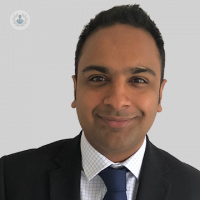Colon capsule endoscopy: making the uncomfortable more comfortable
Written in association with:For decades, a colonoscopy has been the gold standard method to have an examination of the large bowel. However, a new technique called a colon capsule endoscopy is revolutionising colonic assessment by being both non-invasive and painless. Leading consultant gastroenterologist Dr Amit Chattree provides further detail about what it is and what a patient can expect from the procedure in this article.

What is a colon capsule endoscopy?
Colon capsule endoscopy is an examination of the large bowel of the colon using a small video capsule pill with a camera that is swallowed. It is entirely painless and travels through your colon taking images and a video, and it can be used to examine the entire line of your colon looking for pathology in a similar way to a colonoscopy. Like colonoscopy, colon capsule endoscopy can be used to detect various pathologies such as polyps, tumours, cancers, diverticular disease, haemorrhoids, and bleeding blood vessels (angiodysplasia).
How does it differ from a colonoscopy? Is it as good as a colonoscopy?
It is entirely non-invasive and painless unlike the colonoscopy, which is an invasive procedure where you have an endoscopic camera inserted 80 to 90 centimetres internally. In the appropriate setting, the diagnostic yield is comparable to colonoscopy with a very high diagnostic yield. The test can also be modified to examine both the small and large bowel in one test which is another major benefit. Like colonoscopy, bowel preparation drinks are required to cleanse the bowel to allow adequate views. Additional special booster drinks that help the capsule go through your intestines and take the video are also needed.
Who might benefit from a colon capsule endoscopy?
Colon capsule endoscopy is an excellent option for patients who cannot have a colonoscopy because:
- They have undergone previous operations that make their bowel impassable.
- They have had a very bad experience with a colonoscopy (e.g. very painful procedure).
- A previous complication from a colonoscopy.
- Significant anxiety about undergoing an invasive procedure such as colonoscopy.
What conditions can be diagnosed using a colon capsule endoscopy?
There most common conditions diagnosed with a colon capsule endoscopy are:
How long does it take to pass?
With the boosters, it should pass out after about eight or nine hours. You don’t need to retrieve it as it just gets passed out in the toilet.
Is the test safe? Can the capsule get stuck? When should a medical professional be seen?
Colon capsule endoscopy is a very safe test. In addition, prior to undergoing the procedure you will undergo a detailed pre-assessment consultation to ensure that any special considerations are accounted for. This includes the risk of the capsule getting stuck in the intestines. This risk is generally extremely low (less than 0.5 per cent). In patients in whom there might be additional concerns, a patency capsule (a dummy pill of the same size that dissolves after 30 hours) can be used prior to colon capsule endoscopy to ensure then we know it’s entirely safe to proceed. With a successful patency capsule, the risk of a retained capsule is reduced further still.
Follow-up checks after the procedure will also take place. If the capsule has not been seen to pass out after two weeks, please contact your medical professional but do not be alarmed as usually the capsule will have passed out in stool unseen.
If you need to have a colonoscopy but are more interested in having a colon capsule endoscopy, you can go to Dr Chattree's profile and book a consultation.


